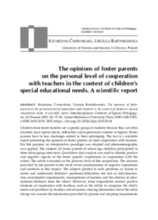Children from foster families are a specific group of students because they are often disabled, have special needs, difficulties and experienced violence or neglect. Foster parents have to face challenges related to their upbringing. The text is a scientific report presenting the opinions of foster parents on their cooperation with teachers. For this purpose, an interpretative paradigm was adopted and phenomenography was applied. The subjects (21 foster parents of school-age children) participated in three focus group interviews. Qualitative data analysis was used to identify positive and negative aspects of the foster parents’ experiences in cooperation with the school. The article is focused on the personal level of this cooperation. The answers provided by the parents in the study reveal predominance of negative experiences and emotions in this respect. The subjects pointed to such problems as: failure to notice and understand children’s problems/difficulties, the lack of individualization, maladjusted requirements, incompetence of teachers and the absence of informational feedback from the school. However, some respondents noticed positive elements of cooperation with teachers, such as the ability to recognize the child’s needs and problems by teachers and educators, sharing information about the child, taking into account the information provided by parents and adapting requirements to the child’s abilities. The results were used to develop recommendations aimed at improving cooperation between the school and foster parents.

